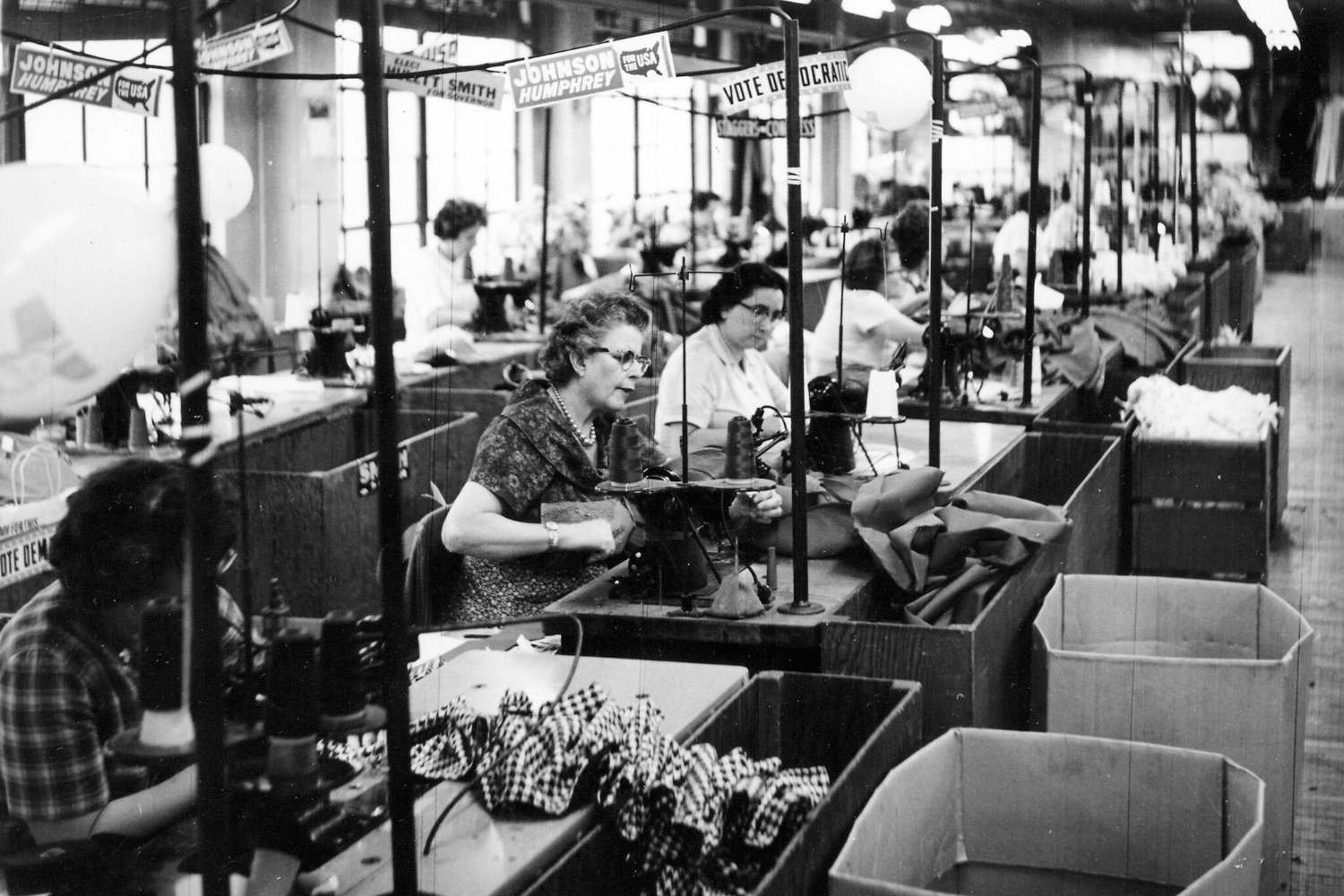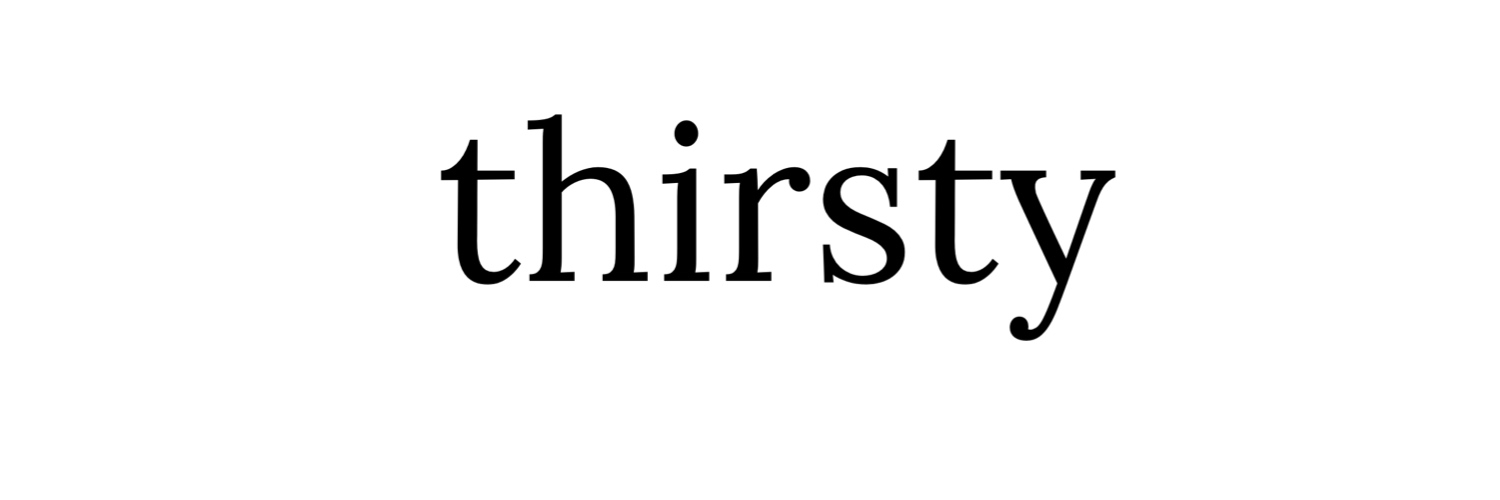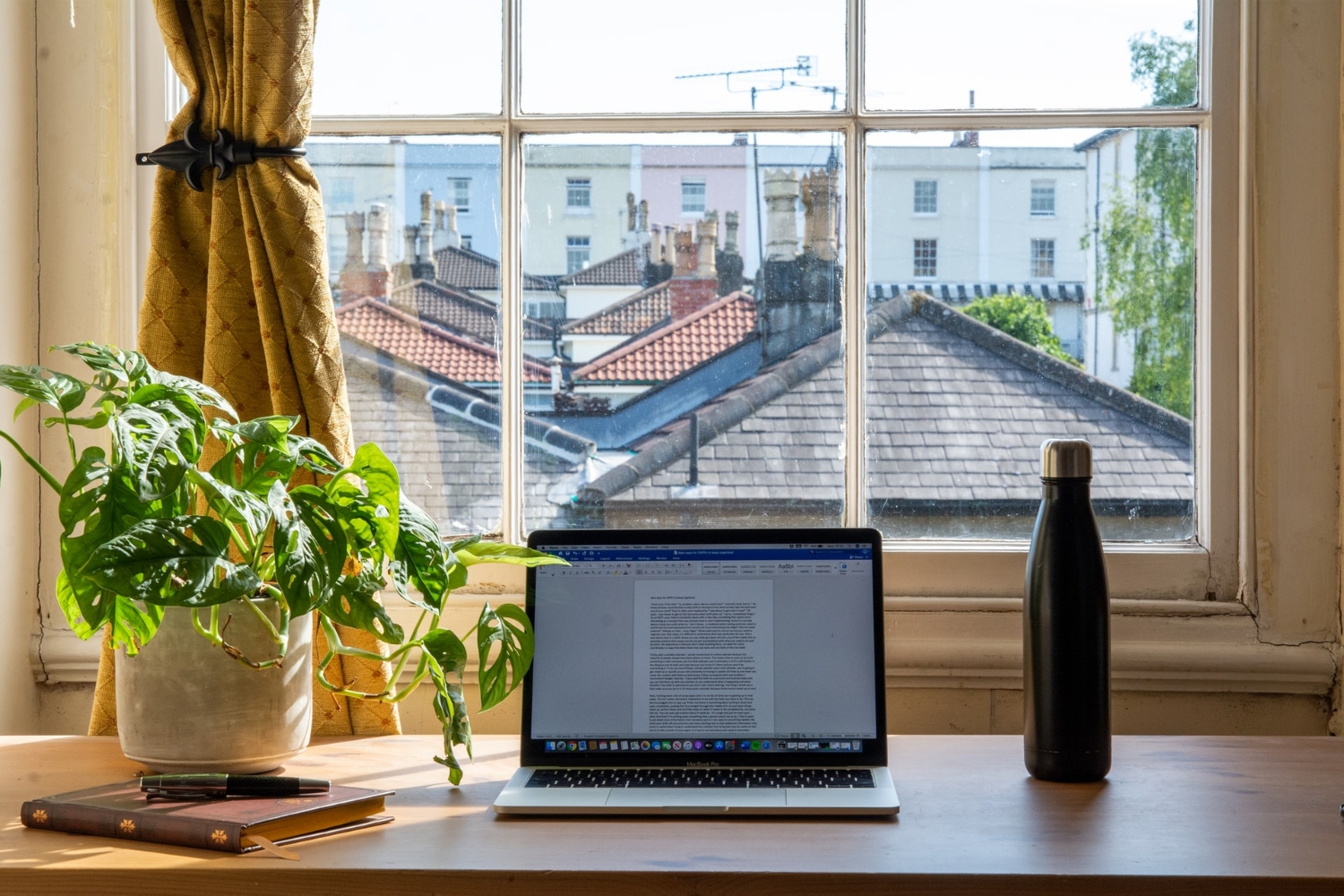Self-Care and Productivity: Can You Have Your Cake and Eat It Too?
You don’t need affirmations for productivity, you need to chill the f*ck out.
by Alicia Butler, July 14, 2022

CC BY 2.0: Kheel Center/Women sewing at a garment factory with election signs for Johnson-Humphrey and others overhead
A few years ago, I wrote an article titled “How to Be Productive When You Just Can’t.”
It was a bit of basic advice on how to power through a slump and get sh*t done, even if you’re not feeling it. But when it comes to self-care and productivity, my views on this topic have changed pretty drastically over the past year.
The original article was posted at the beginning of the COVID-19 lockdown. Not only was the world going through an existential crisis, but as billions of people around the world were faced with uncertainty and grieving so much loss, I was coming out of a deep three-month depression.
It was a weird time to finally be feeling “like myself” again when so many others were facing disease, financial ruin, homelessness, and more.
I’d struggled to be productive throughout the beginning of 2020 and (little did I know) those struggles would not stop with the lightening of my depression. As 2020 raged on, I would be pulled away from work by news of civil unrest, doom scrolling, politics, and more.
The world was literally falling apart, and I was trying to keep my work-to-output ratio… golden?
Even now that COVID is over we’re being constantly gaslit into believing “everything is just fine,” Dory’s mantra in Finding Nemo, “Just keep swimming,” (advice meant to help us move past trauma) now feels dystopian. Like the last gasp of corporate America.
The crazy thing is, I work for myself. There are certain tasks I need to complete each month, but by no means have I worked a 9-to-5 in the past few years, even during even my busiest months. I was my own oppressive manager, breathing down my own neck.
In the name of self-care and productivity, why was I doing this to myself?
American History of Productivity
So why was I so obsessed with being productive? Do self-care and productivity go together at all?
Americans have been flirting with productivity since before the Revolution.
The first written accounts of the word show up in the 1776 economics book, The Wealth of Nations, written by the forefather of capitalism, Adam Smith. He went as far as to call out some work as productive and other types as unproductive. Factory work was good, housework (read: women’s work) not so much.
Yet, Smith did believe that workers wouldn’t be efficient if they were too demoralized and thus should be educated to prevent burnout. Feels kind of like the Bullshit Jobs of the 19th century.
The U.S. also has a history of violence with productivity. Slavery and sweatshops were both justified in the name of it.
But our obsession with productivity really gets going after the industrial revolution. Once we had the technology to speed up the production of goods, an emphasis was placed on making them even faster.
And companies wanted to ensure that they were the ones benefiting from their investments, not workers.
Productivity wasn’t just a burden on workers, either. Everyone up the chain started feeling the pressure of it.
By the 1850s, day planners were all the rage, and efficiency experts were hired to consult at factories.
Self-Care and Productivity: Can the two go hand-in-hand?
Can self-care and productivity co-exist?
Productivity is defined as: “a measure of economic performance that compares the amount of goods and services produced (output) with the amount of inputs used to produce those goods and services.”
Self-care is the stretching of one’s limits — not the overextension of them.
By performing self-care, we can make ourselves more productive. But when productivity is the only goal, we may lose the benefits of self-care.
Philosophers believed that self-care was synonymous with self-improvement.
“Self-care isn’t performative self-coddling. It’s doing the hard work of examining and improving yourself in order to better serve the world. You can’t love/save humanity if you can’t love/save yourself, and the clock is ticking on both projects.”
Can an obsession with productivity make you less productive?
Self-care and productivity obsessions can reap the exact results you don’t want.
When we become obsessed with productivity, we stop doing something for its enjoyment and only do it for its outcome (products, money, thinness, etc.).
Or, we can become obsessed with how we’re perceived by others since society values productivity and demonizes “laziness”.
Anyone obsessed with productivity may want to analyze why they value it to the point of obsession.
“Obsessions are recurrent and persistent thoughts, impulses, or images that cause distressing emotions such as anxiety or disgust. Many people with OCD recognize that the thoughts, impulses, or images are a product of their mind and are excessive or unreasonable.”
An obsession with productivity is a fixation on getting more in less time or for less money or effort.
I don’t know about you, but this doesn’t sound fun at all to me.
I’m much more likely to want to do a job if I’m enjoying it and feel that I’m compensated fairly for it. And when I’m enjoying myself, in a state of flow, and receive fair compensation, I’m much more likely to be productive and far less likely to make mistakes.
And I’m not the only one who feels this way. “The truth is that higher salaries tend to incentivize a culture of high output.”
Self-Care: Treating Our Productivity Obsession
Self-care can help us get introspective about our obsessions and why we’re so fixated on them. In fact, self-care and productivity can go hand in hand.
And while productivity isn’t necessarily a bad thing, becoming obsessed with it could be on par with becoming obsessed with exercise, healthy eating, or other “positive” behaviors.
We as a society assign moral value to activities like exercising and “clean” eating. “She’s so good. She runs five miles a day.” Or, He’s so regimented. “He only eats veggies and grilled fish.”
When someone retires without ever having taken a sick day, it’s a story on the news. Not only can this reward system lead to burnout, but it’s also extremely ableist. Just as assigning morality to only certain “healthy” behaviors is ableist, sexist, and racist.
We value “perfection” and productivity in our society, but how often do we actually look within to figure out why we value these things? Is it because society tells us we should? Or because they make our lives better?
What would happen if we stopped valuing productivity and focused instead on self-care and fulfillment?
Self-Care and Productivity Tips
Self-care and productivity can go hand-in-hand. But using self-care to be more productive might look and feel a little “backward” at first. That’s because we’re been conditioned to value our outputs by burning the midnight oil, working hard and playing hard, and keeping our nose to the grindstone.
Taking time for rest and focusing on what gives us pleasure are not in the capitalist or consumerism playbooks. We must be more productive so we can make more and buy more.
How does balancing self-care and productivity help you reevaluate your relationship with “doing” and help you fill your cup?
Disclaimer: these self-care and productivity tips are for those of us with enough privilege to call some of our own shots.
Anyone who is forced to work more than one job, sleep in their car, is buried in debt, or living paycheck to paycheck, I see you.
I was stuck in debt for a decade. I couldn’t get a credit card, loan, or apartment. The only reason I was able to crawl out of debt is because I had the privilege of living with my parents for six months in 2020 (and stay out of it because I lived with them again for six months in 2022).
If you’re working crazy hours, earning minimum wage, or can’t get out of debt, the only thing I can say is to reclaim as much of your own time as possible. Don’t feel guilty for taking sick days and bathroom breaks.
And if you’re not one of the 64% of Americans living paycheck to paycheck? These self-care and productivity tips might help you feel good about what you do.
Rest First
Self-care and productivity can work together, but you can’t be productive if you aren’t rested.
Laura Vanderkamp, time management expert and author of Off the Clock: Feel Less Busy While Getting More Done, argues, “It’s not wasting time to engage in leisure activities that are rejuvenating to you. It’s a false dichotomy.”
According to Nancy C. Andreasen, chair of psychiatry at the University of Iowa Carver College of Medicine, if you want self-care and productivity and to complete focused work, you first need rest.
Many companies around the world are flirting with the idea of four-day work weeks (the Netherlands already has the shortest work week in the world, clocking in at only 29.5 hours a week).
According to MIT, last year in Iceland, researchers found that a four-day workweek without a pay cut improved workers’ well-being and productivity.
And rest isn’t all about productivity, either. In her book, How to Do Nothing: Resisting the Attention Economy, Jenny Odell argues, “The point of doing nothing, as I define it, isn’t to return to work refreshed and ready to be more productive, but rather to question what we currently perceive as productive.”
Audrey Lourde wrote in A Burst of Light, “Caring for myself is not self-indulgence. It is self-preservation, and that is an act of political warfare.”
If you’re unable to rest first, don’t beat yourself up about it. We’ve all been conditioned to believe we need to work at least 40 hours a week to avoid laziness.
When I think about a four-day work week, I get all itchy and nervous. What would I do with that time? Would I just be wasting it? Or would it actually help me meet my life goals?
If you have the privilege of cutting back on your work schedule, try taking an extra hour or two off if doing more feels uncomfortable.
Discover Your Why
Another way to use self-care and productivity hand in hand is to discover your why. Why do you want to complete a task in the first place?
There are a lot of reasons why you’d want to be productive. You need money. You need to perform well at your job. You want to finish work early because you’re excited to make macrame plant hangers surrounded by your cats.
Remembering why you’re doing a “productive” task can help.
Sometimes we drag our feet because we feel self-conscious, afraid to fail, or unqualified for the task at hand.
If you find yourself dragging your feet to finish a task, ask yourself why. Usually it’s not laziness.
In fact, Devon Price, author of Laziness Does Not Exist, would argue laziness is a lie.
Calling yourself “lazy” is lazy itself because instead of getting curious about why you’re not completing a task or doing work, you’re just assigning your behavior a label to avoid feeling the discomfort of curiosity.
Maybe you’ll discover you don’t want to write the article because you’re worried you’ll get negative feedback. Maybe you just find writing about 20 ways to get stains out of lace really freakin’ boring.
But at least boredom and self-consciousness are stuff you can deal with and find ways to overcome.
Do What You Love
When it comes to self-care and productivity, all of these are great reasons to want to be productive.
But I for one am much more likely to complete a task I enjoy.
No, life isn’t all puppy dog kisses and rainbow smiles. We can’t love every task in our lives. But we can find ways to incorporate more tasks we love into our days and love the tasks on our plate.
Steve Jobs once famously said, ”the only way to do great work is to love what you do.” (This is rich coming from one of the most infamous bullies in the tech world). But Jobs obviously loved (was obsessed with?) what he did, and I don’t think you necessarily need to work for someone abusive to do work that you love.
One way to help you love your job more is to find the activities that put you in a state of flow or that “in-the-zone” experience.
“Doing work you love is energizing and creates a positive feedback loop that fuels productivity. Your passion for the work energizes you and vice versa, giving you more fuel to put towards success. The trick is figuring out how to make yourself love your work – even the most tedious of tasks.”
I also find that savoring my tasks can help me enjoy them more. What is savoring? It’s the art of being mindful of everything, even the not-so-good stuff.
Keeping lists of my favorite parts of the day helps me remember them and savor them later (especially the little things that I probably would’ve forgotten otherwise).
Let Go of Perfectionism
Vandekamp also discovered that perfectionism is another killer of productivity and that people who feel like they have enough time “let go of expectations of perfection and big results in the short run. Instead, they decide that good enough is good enough, knowing that steady progress over the long run is unstoppable.”
If you care about self-care and productivity, you may need to let go of perfectionism.
Take Sick Days
Another step toward self-care and productivity is to take sick days. And mental health days. And vacation days.
Sometimes rest doesn’t just need to happen before the work. Often, our bodies tell us when we need to slow down or come to a full stop. And as for being productive when you just can’t? If you’re in a place of privilege and can set those to-dos aside for a few hours or days, don’t sweat it.
Accept the Bad Days
I find that when I deal with the bad days (or just the not-so-good parts of my day), I’m more equipped to just deal with them and move on. Dealing with negative feelings (instead of ignoring them and stuffing them down) is one way I avoid gaslighting myself with toxic positivity.


